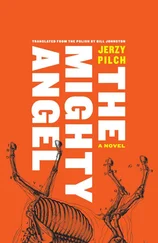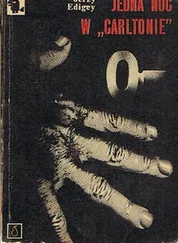Sometimes, from the snowed-under center of town, you could hear bells. Had the sexton climbed the tower as usual? Did he see the tufts of smoke over the snowed-under environs? How did he manage with ropes that were frozen solid? Did shadows in hoods help him? My fever jumped, I wasn’t seeing phantoms, phantoms were my fervent dream. Some sort of connections existed. Tunnels carved out by animals, perhaps on the surface, and in the other direction you had to drag yourself to the road to Polana. Sometimes Pastor Kalinowski would disappear for a day, two days; the little room over the stairs, in which he lived, was locked up tight. Maybe he broke his way through by some miracle and was conducting a funeral in the labyrinths at the cemetery or a service in the icy church? Not likely, but who knows?
From time to time, everybody kept getting lost. Most often it was Uncle Paweł, but at least with him the matter was clear; it was known to one and all what he was looking for. He had been drinking since the wedding, which is to say, for four months now, and he still had something to drink. He must have been distilling it from the snow. Besides, there could still be reserves frozen in the cellars for all time. The Trzmielowskis prepared for the wedding party as if they knew that it would last half a year. Seven bridesmaids alone, of whom three were identically pregnant. All of them in the eighth month, and all called Hanula. All had dresses, veils, and sulfuric acid prepared, in order to disfigure, as soon as she left the church, the most beautiful of them, the one whom the groom would choose. The four other Hanulas finally gave up, dressed in black, wound black scarfs around their heads, and sat in the same pew. Young Trzmielowski had spent a May night with each of them, but God hadn’t been on their side. He didn’t stop the blood. He didn’t send them an appetite for herrings and pickles, and He didn’t cause their bellies to grow. For what sins? — nobody really knows. Their lives are over. One of them will throw herself under a train in three years; the second will still be living today, if she lives, in black; the third will emigrate, and they will say of her that she became a popular waitress in a Roman café; about the fourth, absolutely no news would be heard. Four fewer, but two were still in play. Two, because the prettiest is already standing at the altar. But those others in unstarched dresses, with veils aslant, with pots, from which a yellowish-brown smoke belches forth, are somewhere in the vicinity. They descend from the mountains, they are already at the station, they walk around the ski jump, and perhaps they are already circling the church.
There are people everywhere, even in the balconies, but no one is capable of concentrating on the bride and groom standing at the altar. Even the masters of ceremonies are looking around apprehensively. Old lady Mary, the bravest of them all, stands up from the pew time and again, goes out, comes back. Nothing gets better. The organist plunks away, but no one knows wedding hymns. In the hymnal, there are three wedding hymns for every hundred funeral dirges. Three pathetic hymns to the matrimonial altar for a hundred fantastic ones to the coffin. At burials and in cemeteries, everyone sings in top form. At weddings, no one can be bothered with pious ditties. And now? No point in wishing for better! The sulfur is about to flow, the terrible scream of the scalded bride is about to soar above the steeple. Finally, the organist plays When the morning stars are rising… but this causes an even greater muddle, because some are singing: “When the morning stars are rising/ Earth and sea Thy glories praising/ Join all nature’s voice in singing/ Praise to Thee, Oh God, we’re bringing,” and the rest, from out of the blue, although to that same melody: “In the path of Christ the Lord/ Let us sing with one accord/ For Christ this way did bring/ After eating songs to sing.” It was as if a swarm of buzzing hornets was flying under the church’s ceiling — such tension, and then suddenly quiet, a calm as after a storm. As then, when I stand in the window and gaze at the steaming stones of the Wisła courtyard, at Chowderhead the cat, walking cautiously between the puddles. Peace and quiet, as if there were no God and all his ghosts. Brethren, silence your hearts. Supposedly the four black Hanulas got up and left, and that was a guarantee that nothing would happen. But as soon as they moved away from the altar, the organist — he must have been completely out of it by now — started in on: For he’s a jolly good fellow… Only now did old lady Mary fly up the stairs to the organ like a jet plane; the sudden relief gave her more strength. But before she got there, he had started in on He that dwelleth… and it came out so well that people were sorry to leave the church steeple behind. The horses were washed, their manes plaited, to the britzkas, my damsels, to the britzkas. Through the ill-boding November air, around Czantoria, around Jarzębata and Kamienny, and up the serpentine road to Kubalonka, and to the station, and just a bit past the station. Seven barriers along the way. Dirty sheepskins on the left, ram’s fur, coal on the faces. We get past a few Beelzebubs and a barrier! A barrier on all three bridges. A barrier at Jurzyków, a barrier in Jawornik, a barrier in Gościejów, and, just before the house, yet another barrier. Paper money and combustible schnapps. Bread and salt. The musicians walk out into the courtyard and sit down on stools, and at first it is quiet, as if the celebration were coming from far off, but then ever louder and ever stronger, as if we were closer and closer to the meadow on which the first couples are dancing, as if I saw more and more, as if — only then — I was everywhere and saw everything, and as if — only then — I could tell of everything.
It was God’s doing that I sat at the table next to Emma Lunatyczka; that was a miracle, because the wedding guests came in a horde, and there were probably twenty-five tables, through all the rooms, like a white path through a labyrinth. Emma Lunatyczka was wearing an incomplete Silesian costume, and this — fuck it — killed me. In two weeks I was going to come down with whooping cough, scarlet fever, an infection of the inner ear, flu, tonsillitis, everything. In two week, unconscious, with a 104-degree temperature, I was to find myself in her bed. But now, on the spot, I came down with a bad case of incomplete Silesian costume, and later on it would be a bad case of any incomplete costume in general. Incurably, and for the rest of my life. Emma was wearing a heavy velvet skirt with a navy blue edging at the bottom, but a blouse of quite a different sort. The incredible blouses of delicate linen, and with the open shoulders and the small mandarin collar — the young girls would be wearing them half a century later. Christ the Lord! What a combination this was! A carnival bottom and white linen top. She looked as if, not yet ready, while searching for a sash or a bonnet, she had gotten mixed up with the wedding revelers, or like a mad procession of dancers had barged into her dressing room and swept her up just as she was standing there. The young girls, who were blind to her charms, comforted her in the corners: Don’t worry, we’ll find the whole costume for you for the next wedding! For sure! Emma thanked them humbly, but her gray and sparkling eyes betrayed her — she knew that she was the queen.
I wandered around the whole house: in the first room, those who were playing on combs prepared for their performance; in the second, those who were playing on bottles; in the third, miners from an American gold mine were changing into full regalia. The hallway was high, dark, and cold, like in a knight’s castle, all the doors black and tall, behind the fifth were reserve food supplies, behind the sixth a fire burned in the stove, around which sat the four black Hanulas. I was sure that they were crying; they had cried the whole time in the church, and it looked like they would go on crying until the ends of the lives — but no way! Heated, flushed, with black scarfs already undone, though not yet removed from their heads, they were as happy as clams, as if the decision had been for them after all.
Читать дальше












